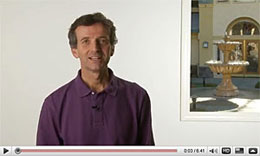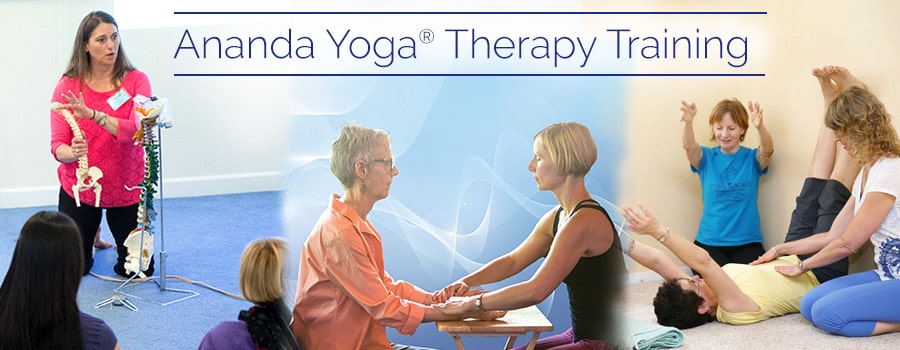SYLLABUS
Ananda Yoga® Therapy Training: Principles
We are not currently accepting new students in the Ananda Yoga Therapy Training
Course Hours: Total = 74 (Residential and Distance)
- Residential = 42 (with 6 hours Practicum)
- Distance = 32 (as Home Practicum)
- Practicum = 38 (6 hours Residential; 32 Distance)
Prerequisite
Graduate of Ananda Yoga Teacher Training, and one year of personal practice and one year of experience teaching Ananda Yoga (minimum of 80 hours).
OR, graduate of a RYS-200 program, who has taken Bridge to Ananda Yoga and has taught 30 hours of Ananda Yoga. Must also have a year’s personal practice, and have completed an Application for Ananda Yoga Therapy Training.
Teaching Format
This is a 7-day residential course which includes a combination of lecture, discussion, case studies and practicum (both distance and residential).
Course Description
This in-depth 7-day program is the first module of Ananda’s Yoga Therapy Training. It provides many practical foundational skills necessary for a safe and effective yoga therapy practice including assessment skills from the perspective of structure and function, posture alignment, breath, subtle energy, chakras, Ayurvedic Assessment of Prakruti, Vikruti, Gunas. Intuition and energy healing are presented as essential skills for yoga therapists to cultivate. Therapeutic relationships are discussed as well as practiced by working with volunteer clients in class and at home with faculty supervision. Documentation skills are learned and practiced as well as the basics of business aspects of becoming a yoga therapist. This program is the foundation for all of our other yoga therapy programs.
Faculty: Ananda Yoga Ministers and Meditation Teachers:
Mangala Loper-Powers RN, MN, NP, E-RYT 500, Ananda Yoga Therapist, C-IAYT
Maitri Jones, RN, BSN, E-RYT 500, Ananda Yoga Therapist, C-IAYT
Barbara Bingham, RPT, BS, CYT, Ananda Yoga Therapist
Shanti Rubenstone, MD, Ananda Minister, Teacher & Lecturer,Kriyacharya
Required Texts/Reading Materials & Reading Assignments
- McCall, Timothy B. Yoga as Medicine: The Yogic Prescription for Health & Healing. New York: Bantam, 2012. Print. Chapters 1 & 2, and Afterword (p.493-6)
- Lasater, Judith. Yogabody: Anatomy, Kinesiology, and Asana. Berkeley, CA: Rodmell, 2009
- Simpson, Savitri Chakras Workbook, (2012, Savitri Simpson, self-published) p. 11 – 28 and 40-45.
- Walters, J. Donald., and Devi Novak. Intuition for Starters: How to Know and Trust Your Inner Guidance. Nevada City, CA: Crystal Clarity, 2002. Print.
- Ch. 1 & 2 (pp. 13-43) Ch. 6 pp. 101 to top of 108
- Ayurveda pamphlet, Ayurveda: A Brief Introduction and Guide, (2006, The Ayurvedic Press) (pamphlet will be given to you when you arrive), p. 1 to top of p. 3
- Yogananda. Scientific Healing Affirmations: Theory and Practice of Concentration. Los Angeles: Self-Realization Fellowship, 2012. Print. Chapters 1 – 4 (pp. 3 – 34)
- Yogananda. Divine Will Healing Excerpts (currently out of print) (handout in section 5 of manual)
- Walters, J. Donald. Affirmations for Self-healing. Nevada City, CA: Crystal Clarity, 2005. pp.13-18.
- Yogananda. How to Achieve Glowing Health and Vitality. Nevada City, CA: Crystal Clarity, 2011. Ch.1-Vitalize the Body, pp.9-20; 30-37. Ch.2-All-Round Health, pp.39-49. Ch.7-God’s Healing Power, pp.117-129.
- Ananda Yoga Therapy Training Manual: Principles, read all.
Learning Objectives
At the end of the course, students will:
- Demonstrate practical client assessment skills (including structural and functional assessment, chakra assessment, basic Ayurvedic constitution and imbalances assessment)
- Demonstrate ability to take a client history, create, document, and evaluate individualized therapeutic plans
- Demonstrate a deeper understanding of anatomy, physiology, and kinesiology
- Learn how to design individualized yoga therapy regimes
- Demonstrate understanding of how chakra energy affects client's physical, mental, emotional and spiritual well being and how this knowledge can inform the choice of techniques used in yoga therapy routines.
- Know how Yoga and Ayurveda work together to promote well-being of body, mind, and spirit.
- Demonstrate an understanding of the breadth of Yoga teachings (asanas, meditation, pranayama, diet, yoga philosophy, and more), and how they can be used to help a client therapeutically.
- Know the principles Energy Healing and demonstrate how to send healing energy to others; the roles of prayer and intention;
- Demonstrate understanding of the importance of the power of the mind; the use of affirmations, visualizations, and mantra.
- Be familiar with important issues in conducting the business of yoga therapy, how to communicate with health care professionals and how to generate and interpret referral information.
- Understand how to establish therapeutic relationships with clients, how to set clear boundaries; what are professional and ethical boundaries; listening and communication skills.
Subject Matter/IAYT Competencies Covered
Section 1. Yoga Foundations
Category 1.1. Yoga Teachings and Philosophy
1.1.1 Familiarity with the evolution of the teachings and philosophy of the yoga tradition and its relevance and application to yoga therapy, including teachings from Vedic and post-Vedic periods, Samkhya, Yoga, Tantra, and Ayurveda.
Category 1.2. Yoga and the Mind
1.2.1 Knowledge of yoga perspectives on the structure, states, functioning, and conditions of the mind, including, but not limited to, citta vrtti (activities of the mind), citta parinama (structural changes in the mind), vyutthana/nirodha (mind's potential for distraction and focus)
Category 1.3. Framework for Health and Disease
1.3.1 Knowledge of the basic perspectives on health and disease from yoga and Ayurveda relevant to the practice of yoga therapy.
1.3.1.3 Tri-dosha (effects of the elements on the physical body);
1.3.1.5 prakrti/vikrti (dosha constitution at birth/imbalance of the dosha currently expressed in the body);
1.3.2 Knowledge of categorizing illness
Section 2. Biomedical and Psychological Foundations
Category 2.1. Anatomy and Physiology
2.1.1 Knowledge of human anatomy and physiology, including all major systems of the body and their interrelationships, as relevant to the work of a yoga therapist.
2.1.2 Knowledge of biomechanics and movement as they relate to the practice of yoga and the work of a yoga therapist.
2.1.3 Knowledge of common pathologies and disorders of all the major systems, including symptoms, management, illness trajectories, and contraindications, as relevant to the work of a yoga therapist.
Category 2.2. Additional Biomedical Knowledge
2.2.2 Familiarity with common medical terminology.
2.2.3 Knowledge of how to reference current healthcare information relevant to the work of a yoga therapist, including pathologies, disorders, drugs,and surgical procedures, as relevant to the work of a yoga therapist.
Category 2.5. Body and Mind Integration
2.5.1 Knowledge of the interaction of the body, breath, mind, intellect, and emotions in health and well-being
Section 3. Yoga Therapy Tools and Therapeutic Skills
Category 3.1. Yoga Therapy Tools
3.1.2 In-depth knowledge of the range of yoga practices and their potential therapeutic effects for common conditions. Practices may include, but are not limited to,.
3.1.2.1 Asana (postures);
3.1.2.2 Pranayama (regulated breathing);
3.1.2.3 Meditation and relaxation techniques such as bhavana (visualization), mantra (recitation), and ritualized activities such as nyasa and mudra; and
3.1.3 In-depth knowledge of contraindications of yoga practices for specific conditions and circumstances.
Category 3.2 Basic Principles of the Therapeutic Relationship
3.2.1. In-depth knowledge of, and observed capacity for, well-developed communication skills: listening, presence, directive and non-directive dialogue.
3.2.2. Demonstrated ability to recognize, adjust, and adapt to specific client/student needs in the evolving therapeutic/professional relationship.
3.2.3. Demonstrated ability to recognize and manage the subtle dynamics inherent in the therapist/client relationship.
Category 3.3 Principles and Skills for Educating Clients/Students
3.3.4. In-depth Knowledge of the scope of practice of yoga therapy and how to assess the need for referral to other professional services.
3.3.1. In-depth knowledge of and demonstrated ability to implement effective teaching methods, adapt to unique styles of learning, provide supportive and effective feedback, acknowledge the client's/student's progress, and cope with unique difficulties/successes.
3.3.2. In-depth knowledge of and demonstrated ability to transmit the value of self-awareness and self- responsibility throughout the therapeutic process.
3.3.3. In-depth knowledge of and demonstrated ability to develop and adjust appropriate practice strategies to the client/student.
Section 4. Practicum
Category 4.1 Providing Yoga Therapy
4.1.1 Demonstrated ability to conduct intake and assess the client/student, including
4.1.1.1 Taking a history of the client and his/her condition(s); and
4.1.1.2 Assessing the current condition using the tools relevant to the yoga therapist, including an evaluation of the physical, energetic, mental, emotional, and spiritual dimensions of well-being.
4.1.2. Demonstrated ability to elicit the goals, expectations, and aspirations of the client/student.
4.1.3. Demonstrated ability to integrate information from the intake, evaluation, and observation to develop a working assessment of the client's condition, limitations, and possibilities.
4.1.4. Demonstrated ability to apply knowledge of how to determine which aspects of the client/student's conditions, goals, and aspirations might be addressed through
yoga therapy.
4.1.5. Demonstrated ability to identify priorities and set both long- and short-term goals
with the client/student.
4.1.6. Demonstrated ability to apply knowledge of pacification, purification, and
strengthening strategies.
4.1.7. Demonstrated ability to apply knowledge of strategies that address common
disorders and pathologies of the major human systems and common mental health conditions, as well as other goals and aspirations of the student as relevant to the work of a yoga therapist.
4.1.8. Demonstrated ability to apply knowledge of how to combine intake, evaluation,
observations, and working assessment to develop an appropriate practice or session
strategy for individual clients/students as well as group classes, taking into consideration the holistic nature of the individual.
4.1.9. Demonstrated knowledge of how to choose and prioritize the use of yoga tools and techniques, including selecting, sequencing, adapting, and modifying yoga practices
appropriate to the needs of clients.
4.1.10. Demonstrated ability to teach or deliver the appropriate practices for individuals
as well as groups, taking into consideration the assessment of their conditions, limitations, possibilities, and the overall practice strategy.
4.1.11. Demonstrated ability to facilitate the client/student's experience of the practice.
4.1.12. Demonstrated ability to develop and maintain therapeutic relationships.
4.1.13. Demonstrated ability to provide follow up and re-planning.
Section 5. Professional Practice
Category 5.1 Ethical Principles
5.1.1. In-depth knowledge of yoga practices and methods for self-inquiry related to establishing, practicing, and maintaining ethical principles.
5.1.2. In-depth knowledge of generally accepted ethical principles of health care codes of conduct and yoga's ethical principles.
5.1.3. Demonstrated ability to apply knowledge of generally accepted ethical principles and related concepts from the yoga tHHition to professional interactions and relationships.
5.1.4. In-depth knowledge of the scope of practice of yoga therapy, resulting in the
demonstrated ability to discern the need for referral to other modalities.
5.1.5. Knowledge of the extent of one's own individual training, skills, and evolving
experience in yoga therapy, and knowledge of the importance of practicing within such parameters
Category 5.2. Legal, Regulatory, and Business Issues Pertaining to Yoga Therapy
5.2.1. Knowledge of current relevant local, state, and national laws and regulations impacting the work of a yoga therapist.
5.2.2. Basic knowledge of business practices relevant to the work of a yoga therapist, including record keeping, planning, and financial management.
Category 5.3. Relationships with Peers, Mentors, Clinicians, and Organizations
5.3.2. Basic knowledge of how to establish, maintain, and utilize a referral network of peers and related healthcare practitioners and organizations.
5.3.3. Basic knowledge of how to develop and maintain ongoing collaborative relationships.
Category 5.4. Personal and Professional Development and Continuing Education
5.4.1. Knowledge of the fundamental value of ongoing personal practice, long-term
mentorship, and skills maintenance/development through continuing education.
5.4.2. Knowledge of when and how to seek advice and support for case consultation,
educational advancement, and personal practice
Course Completion Requirements
- Attendance at all classes.
- Completion of all assigned readings.
- Participation in class discussions and activities (including case studies, review sessions, practicums). Participation needs to reflect that the student has learned and begun to assimilate the information from their assigned readings. (The faculty will be assessing whether the student has achieved the level of knowledge and appropriate application of that knowledge according to the IAYT Competencies that apply.)
- Satisfactory performance (80%) on in-class (closed-book) Quizzes. This will indicate an achievement of the stated course Learning Objectives. Students will be given Answer Keys to the Quizzes immediately after taking them, and there will then be time for further Q & A and group discussion with faculty.
- During in-class practicums, students must provide yoga therapy interventions in a safe and appropriate manner, in accordance with the IAYT Competencies for providing yoga therapy (Section 4, Category 4.1), as determined by supervising faculty. Students are given immediate feedback from faculty and peers on all aspects of their observational, assessment, decision-making, planning, teaching and record-keeping skills.
- Satisfactory completion of the Home Practice Assignment. Students are given written feedback by supervising faculty, along with an offer to speak in person or by phone in addition. If the expected standard of satisfactory performance (set by IAYT Standards and Competencies) is not met, then students will be given additional guidance and assignments as needed until they can demonstrate the expected competency.
- If any of the above requirements or expectations are not met, the student will be counseled and/or given additional assignments in order to help them be able to demonstrate satisfactory performance.
Ananda Yoga Therapy Training
- Overview
- Flow Chart of Ananda Yoga® Therapy Training Courses
- Course Syllabi
- Tuition Costs
- Ananda Yoga® Therapy Training Courses Scheduled
- Frequent Questions
- Instructors
- Apply for Level 1
- Student Handbook with Costs
- Bridge to Ananda Yoga
Upcoming Courses in date order
- Bhagavad Gita Retreat
- The Essence of the Yoga Sutras According to Paramhansa Yogananda
- Ananda Meditation® Teacher Training - In Person
- Advanced Pranayama
- Ananda Yoga® Assistantship
- Ananda Yoga® Therapy Training: Principles
- Ananda Yoga® Advanced Training: Therapeutic Yoga for Seniors and Bone Strength
- Restorative Ananda Yoga® Teacher Training - In Person
- Ananda Yoga® Therapy Training: Musculoskeletal–1
- Ananda Yoga® Therapy Training Online: Ayurveda
- Ananda Yoga® Therapy Training Online: Health Challenges–1
- Ananda Meditation® Solutions
- Ananda Spiritual Counseling® Training - In Person
- Ananda Yoga® Therapy Training: Musculoskeletal–2
- Ananda Yoga® Therapy Training Online: Health Challenges–2
- Ananda Yoga® Therapy Training: Psychology and Mental Health
- Ananda Yoga® Therapy Training: Holistic Health Therapist Training
Nursing CEU Eligible: details coming

How to Choose a
Yoga Teacher Training Program

“My 4 weeks of Ananda Yoga Teacher Training was one of the most fulfilling and spiritually transforming periods in my life. All of the faculty, along with the entire Ananda community, were very supportive and nurturing.” – R. F., Lake Bluff, IL.

Testimonial for the Ananda Yoga Therapy Training Program
“The program is all embracing ˜ asana, ayurveda, chakras, special health issues touching on body, mind, and spirit. The instructors were wonderful, knowledgeable, supportive, and enthusiastic.” – T.C., CA.







The yoga therapy components of these courses are based on our accreditation by IAYT, not derived from our status as an RYS with Yoga Alliance Registry.


CONNECT
14618 Tyler Foote Rd
Nevada City, California 95959
Toll free 800-346-5350
Outside US 530-478-7518
LEARN MORE
SUBSCRIBE
Receive uplifting emails with inspirational content and news about our retreat programs, travels, and trainings.
















